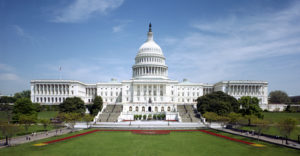A series of recent developments has increased the chances of Senate control changing hands and Senator Mitch McConnell being ousted as Majority Leader.
The authoritative Cook Political Report recently wrote that the odds of Democrats taking control have increased to almost 50-50. It will take a net Democratic gain three or four seats to capture a majority in the Senate, depending on which party wins the presidency.
There are a number of reasons for this dramatically changed political environment. For weeks, Republicans had been rubbing their hands in glee when it looked in all likelihood that Vermont Senator Bernie Sanders would lead the Democratic ticket, because they saw him as more beatable. The sudden surge for former Vice President Joe Biden has changed the political dynamics.
The Trump administration’s inept handling of the coronavirus and the President’s optimistic estimates that the problem would soon disappear have registered with many who question the competence of this administration.
Moreover, for more than three years, the President has boasted about the strong economy and record stock market averages as proof of his successful management of the economy. In recent days, the Dow Jones average has plummeted, major industries are facing dire threats, unemployment is spiking and the country has likely entered into a recession.
Larry Sabato’s Crystal Ball pointed to the historic record: “Second-quarter GDP growth in the election year is an important variable in predicting how an incumbent president will perform in the fall.”
Cook Report quoted one anonymous top Republican strategist describing these events as a “perfect storm” affecting Republican prospects at both the presidential and congressional level.
Individual Senate contests also have moved in the Democratic direction. In Montana, Governor Steve Bullock was persuaded to run for the Senate against Sen. Steve Daines (R-MT). Daines is still favored, but the governor is the one candidate in the state who can take this seat.
In North Carolina, the Cook Report now calls the North Carolina Senate contest, with former state senator and Council endorsee Cal Cunningham, a tossup. Another toss-up is in Maine, between Sen. Susan Collins and Council endorsee Sara Gideon.
The Cook Report found that few Republicans “are sounding optimistic about either Maine Sen. Susan Collins or North Carolina Sen. Thom Tillis, especially over the past few weeks.”
Two Senate seats are very likely to switch parties. Popular former Colorado governor John Hickenlooper (D), endorsed by the Council, and former astronaut Mark Kelly (D) in Arizona both hold modest polling leads over Republican Senators Cory Gardner and Martha McSally, a bad sign for incumbents at this stage of the election.
Other states where there is ferment in Senate races include Kentucky, where Majority Leader McConnell has a serious opponent in Council-backed Amy McGrath; Kansas; Iowa; two Georgia seats and Texas.
With all this tumult in the country, suddenly, “The Senate majority is in play,” said Nathan L. Gonzales, a nonpartisan handicapper and editor of Inside Elections.
Ultimately, the control of the Senate is likely to be strongly influenced by the fate of the President. Whether he is seen as the FDR who brought us out of a deep disaster or the George W. Bush who was overwhelmed by it may be the ultimate determinant.
But no matter what, from Maine to Colorado, prospects are looking up for the Council’s Senate candidates. A shift in the Senate could make a real difference in combating the threats posed by new nuclear weapons systems; gross overspending on defense; and a stunning misallocation of national security funding that should be targeted at confronting the real dangers our nation faces, rather than the legacy of Cold War nuclear weapons strategies.
We need new thinking and new leadership in the Senate, and despite the national emergency currently facing all of us, there may be a very real chance at making that change a reality.

